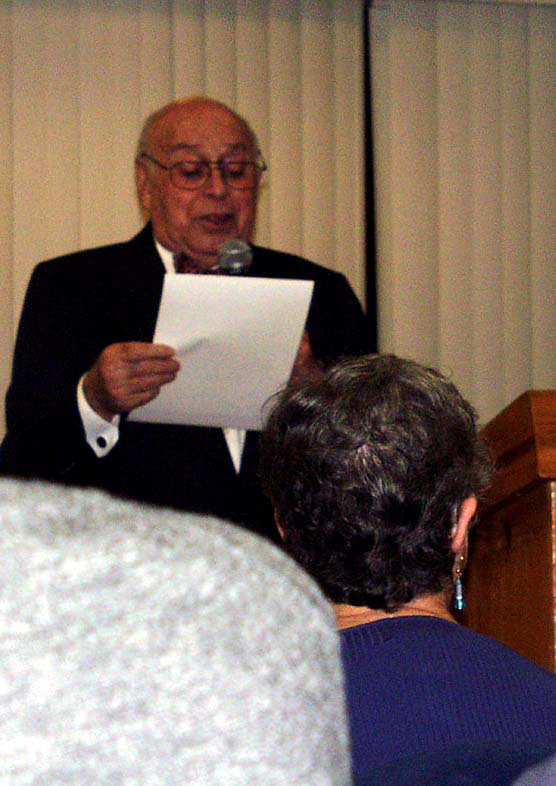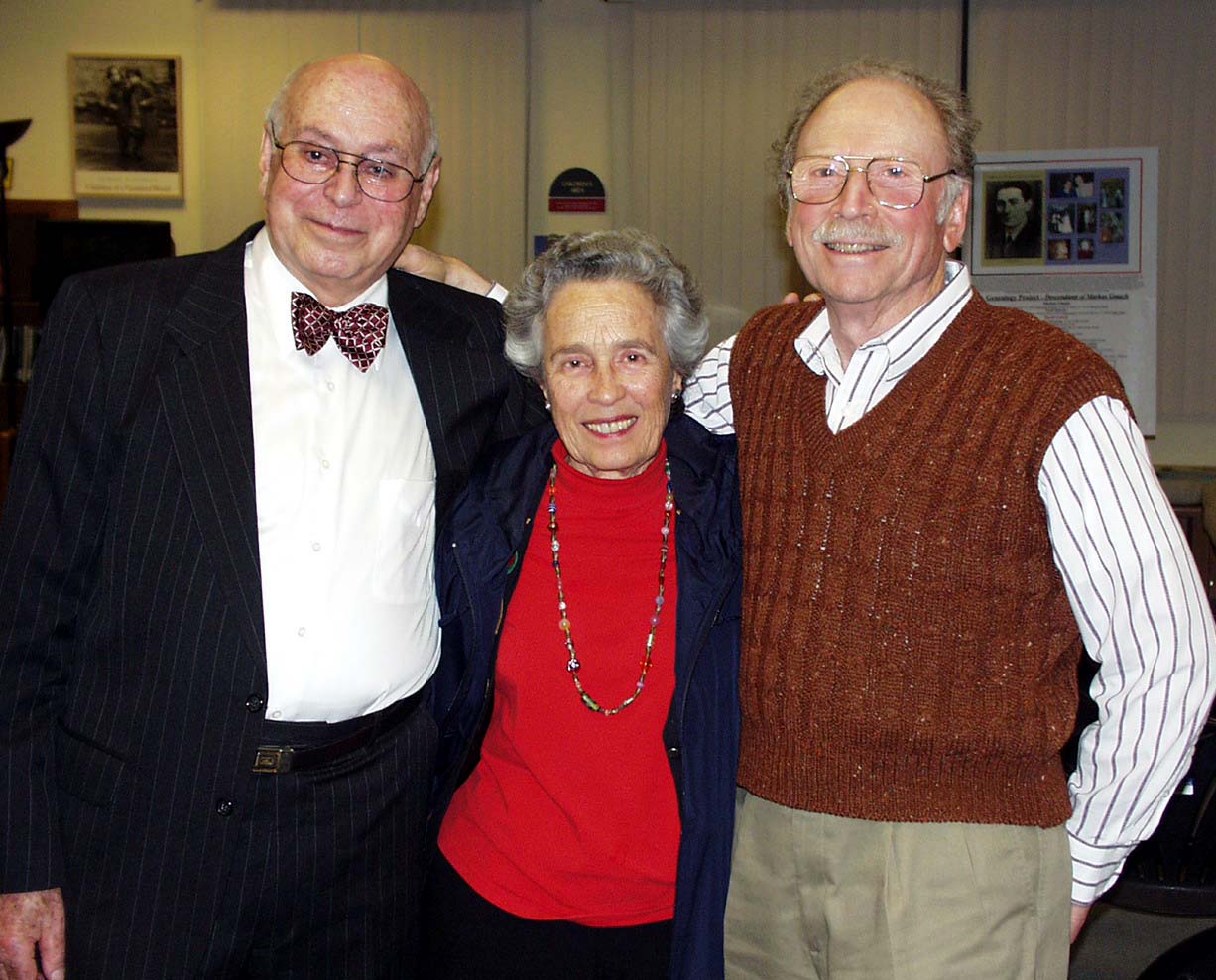|
By Donald H. Harrison
LA JOLLA, Calif.—In Tel Aviv, where a street is named for Zalman Shneour and a museum
collects memorabilia of his literary career along with that of his mentor Haim
Nahman Bialik, a gathering featuring a reading of Shneour's works
and the personal reminiscences of his son, Elie, probably could not have
occurred on such an intimate scale.
The man whose stories and poems in Yiddish and Hebrew made him a familiar figure in the
salons of Paris between the two World Wars—a man in whose home you might bump
into Pablo Picasso playing hide and seek with the Shneour children, or David Ben-Gurion
discussing the prospects of creating a Zionist state—simply would have been
too great a draw overseas to permit so privileged a gathering.
 Elie Shneour, president and research director of Biosystems Research
Institute in the La Jolla area of San Diego, not only read his father's poetry and prose but also played for the
lucky 30 of us a privately-made, primitive recording of his father singing in
Yiddish and Russian. Additionally, those of us in the Astor Judaica
Library of the Lawrence Family Jewish Community Center on Monday evening, April
10, were treated to a sampling of Zalman Shneour's writing that
illustrated his unique perspective on Jewish history as well as his more
romantic side. Elie Shneour, president and research director of Biosystems Research
Institute in the La Jolla area of San Diego, not only read his father's poetry and prose but also played for the
lucky 30 of us a privately-made, primitive recording of his father singing in
Yiddish and Russian. Additionally, those of us in the Astor Judaica
Library of the Lawrence Family Jewish Community Center on Monday evening, April
10, were treated to a sampling of Zalman Shneour's writing that
illustrated his unique perspective on Jewish history as well as his more
romantic side.
The son, now 80, made the gathering even more intimate by
candidly discussing not only his father's brilliance but his flaws. Through his
word pictures, Elie Shneour enabled us to imagine how his father's
conversations with famous friends, coupled with his deep knowledge of a broad
range literature, sometimes would course together in black ink through Zalman Shneour's metal-tipped pen and be transformed into his small, precise, highly
focused handwriting. And we could appreciate that, when the Belorussian-born,
German-educated writer was
concentrating, how important it was for his children to keep the
house quiet, lest he come downstairs from his study, screaming, "Ah, I
can't work in this place!"
How far back do Zalman Shneour's literary excursions go into Jewish consciousness? In the Beginning, an essay excerpted by his son, provides a captivating
answer: Here are its opening paragraphs describing the void of the
biblical Bereshit
In the beginning God knew not that he was
God. Great Chaos reigned. An extraordinary confusion, devoid of hues, devoid
of time, of temperature, of limitations; a disorder that had never known the
nature of motion, or of sound, or what sort of a thing flame is. This
was no darkness—since darkness is but the opposite of light. This was no
dead stillness, for the greatest stillness is no more than opposite of motion,
of noise. This was no gelidity, no—for cold does not give a shading to
warmth. When it is cold one recalls warmth and yearns for it. This was a
nullity. A strange, eternal, all-prevailing dullness. A strange, great
desertlike obscurity, without a past, without a future, without an aim, and
without a meaning, and This reigned not because of anything but just because
it was. There was Chaos because there was Chaos.....
In The Testament of Don Henriques, a poem of a
Jew being burned to death in an auto da fé of the Spanish Inquisition, Zalman Shneour
imagined the Jewish martyr addressing his last words to his "ancient
brother of Galilee:"
...Do not place your trust in the Gentiles, Jesus!
Wandering through the centuries
I have learned their customs and mores,
I have compared their deeds with their words—
Your mercy is not to their taste:
It is as straw to the maw of the lion
Maloch still reigns in their churches
And the lust of the hunter still seethes in their blood...
The son's survey took us as well to Eastern Europe to pay
tribute to the hard-working Jewish peasants, in Where Are You Now?
...You were always redolent of timberland, axle-grease, rye flour and raw
hides. Even on the eve of the Sabbath, after the ritual bath, when you
struggled into your frayed, shrunken gabardines bought for the day of your
wedding; your bodies carried scents of your daily toil. You held your
prayer-books tenderly as if they were floundering yellow chicks; you held them
up while you swayed piously in prayer, with the same calloused, scarred hands
that heaved five-hundred-pound sacks and crates onto drays as if those sacks
were no heavier than skeins of cotton yarn...
In the voice of a biblical prophet, After the Warsaw Ghetto
assured Nazi Germany of the fate that awaited it at the end of World War II:
...No eye shall pity you,
Who shed so much blood.
You would have slain all the rest of us
If only you could.
What have you done with your heritage,
With your great past,
Sons of Beethoven and Goethe?
They would have shuddered at what you did,
Would have turned away from you, aghast.
What would Kant and Helmholtz have said?
They would have shrunk back,
You flung away their treasures of spirit,
And there is left only an empty sack...
The poet also wrote of love, and disappointment. In And There Are
Times, he mused:
..And there are times when dreams are vanities
Shadows of beauty, altars unto love,
And in the heart, the longings that arise—
All are beautiful—and all are lies....
As if to prove the thesis, the son read another of his father's poems, Forsaken:
Long past midnight I sit here
All alone with grief and fear,
And my heart is sore.
I hear the clock strike one,
One, one, one,
I have a husband but he has gone,
He loves me no more...
Elie Shneour also read for his friends Hal and
EileenWingard—the latter of whom introduced him at
the JCC event—A Whisper in Your Ear, one of their favorites of his
fathers' poems.
Red apples, green shadows,
Velvet grass, silk sky,
And with happy laughter
The stream rushing by
Come, my lovely angel
Plucking from the tree
You an apple, me an apple,
And a kiss for me...

How, it was asked during a question-and-answer session, had Zalman
Shneour gone about such writing? What was
his father's routine?
"He was a very disciplined writer," Elie responded. "He
would get up very early and would go down and have breakfast—eggs and coffee
and a few other things that he could eat—and then he would go up...to the
second floor where he had a bed and a study with a beautiful view and would do
nothing but ... work steadily until noon time.
Elie Shneour, Eileen Wingard and Hal Wingard on April 10, 2006 "And that was his best
time. In the afternoon, he would usually go do other things. He would
walk, he would meet with people, he would go to Paris...where all the cognoscenti
would meet." Sometimes Elie would accompany his father to meet the famous painters
and writers who would gather in the salon of Gertrude Stein, and, being only a
boy, " I was
bored to death" because he would have to sit quietly while the
adults discussed politics and literature. The afternoon walks with his
father, however, were fun and quite memorable. "He was a very strong, very
earthy human being. When we wandered into the woods about a mile from us,
he would urinate in public, and said it is a wonderful feeling to urinate on the
leaves, and he enjoyed every aspect of living." His father had a way of
walking into the room—"he was tall, very handsome, women literally fell
at his feet, and I could tell you stories about his womanizing."
Despite the fact that Elie's mother, Salomea Landau, was a beautiful woman and a talented pianist,
his father...well... the son's voice trailed off as he gave his audience a look
that suggested such was simply the way his father was.
Elie admitted that it had not always been easy to be the son of a literary icon.
His mother once told him that he never would be as great as his father, and he
can recall once blurting to the poet, "I wish that I was the son of a
plumber." In a family where his father was a writer, his mother a
pianist, his sister, and his sister Renée Rebecca a dancer under the
professional name of Laura Toledo, Elie joked that he was the black sheep.
"I am a scientist!" Once, on a trip to Israel to give a
scientific lecture, after being introduced as Zalman Shneour son, he snapped:
"Dammit, I am not here as Zalman Shneour's son, I got here on my
own!"
When he was a boy in France, Elie's parents used to entertain dignitaries
at dinner parties. Conversation and wine flowed copiously, occasionally
causing Zalman the kind of restless night that resulted in him leaving his bed
for his writing table.
Often, Elie and his sister would be summoned to perform for the guests in the
salon—his sister dancing beautifully, and he playing the piano. "I was
lousy," he said, probably being unfair to himself. His credentials as
a musician are strong enough to have served as a rehearsal conductor for the Columbia
Orchestra.
Abba Eban and Ze'ev Jabotinsky were some of the Zionist leaders with whom his
father had close friendships and he often would debate religious philosophy
with the Lubavitcher Rebbe, Menachem Mendel Schneerson. The two men
had a bond: Zalman Shneour was a direct descendant of his namesake, Shneour
Zalman—the founder of the Chabad movement.
When Nazi Germany was swallowing France, Elie learned that his father had clay feet.
Zalman was utterly inert, unable to act in the face of
the threat, believing that "this is the 20th Century; nothing can happen to
France," Elie quoted his father as saying. "My mother said, 'no,
we have to go,' and if she hadn't done it I would not be speaking with you
today. We are the only survivors of our immediate family. Everyone
else ended up in the death chamber."
Elie, in fact, was captured and sent to the French concentration camp at Drancy,
but he escaped before the Germans could send him to Auschwitz. He said the
Nobel laureate Elie Wiesel once told him that his father, too, simply could not
believe anything bad would happen to the Jews of France. The Shneours made
it to safety through neighboring Spain, immigrating in 1941 to New York
City. There Zalman syndicated his
stories to Jewish newspapers all over the world. The Shneours obtained
property in Israel, which they visited occasionally. Zalman Shneour, 72, died
in 1959 after suffering a heart attack on a flight back to New York. His
body was returned to Israel where he is buried next to Bialik.
(The International copyrights on the literary works of Zalman Shneour quoted
above are secured by the Zalman Shneour Literary Trust, and are reprinted by
permission.)
|

